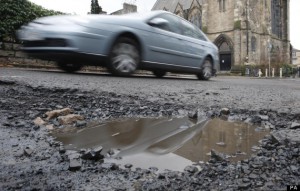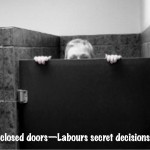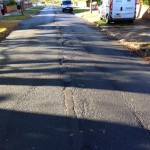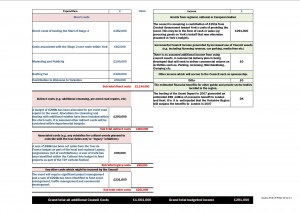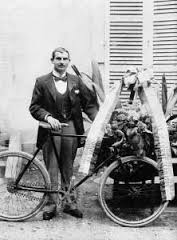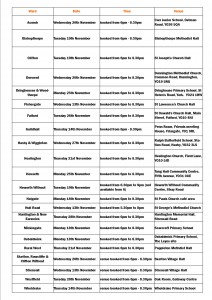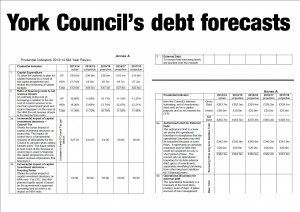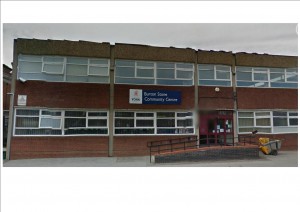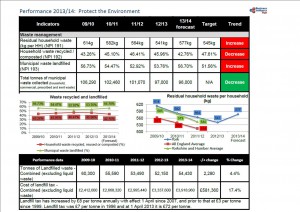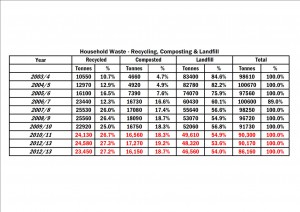Frontline services threatened by membership of Leeds super council
Liberal Democrats have raised fresh concerns over York’s membership of a new super council after it was revealed that money could be cut from frontline survices to fund the City’s contribution.
Labour run City of York Council has decided to join with Leeds, Bradford and other West Yorkshire metropolitan authorities in a new super council, the West Yorkshire Combined Authority, from April 2014. York will be expected to contribute around £4million-a-year to the authority, which will have a range of roles including deciding major local transport schemes and overseeing economic development.
At last week’s Full Council meeting, in response to a question from Lib Dem Councillor Keith Orrell, Labour confirmed that they did not know where the £4million-a-year would come from but they would consider taking it from York’s revenue budget – which funds frontline services.
(more…)
Highways maintenance cuts for York revealed.
The Council has revealed how it plans to spend £2.6 million on highways and footpath resurfacing over the next financial year.
The provisional expenditure is down on the £3.4 million being invested during the current year.
That in turn was well down on the budget agreed by the last Liberal Democrat administration which held power until 2011 and which regularly invested over £5 million a year in the highways network.
Carriageway surfaces are now breaking up and the repairs backlog is growing.
In the Westfield ward footpaths in parts of three streets are due to receive attention next year. Roads affected are Cornlands Road, Wetherby Road, and Green Lane. However there are no plans to resurface any roads (carriageways) in the area.
A full list of streets where repairs are planned can be downloaded by clicking here
A final Council highways budget for next year will be announced in March.
The decision, on which roads to resurface, was taken in another “behind closed doors” meeting. There was no consultation with residents on the options.
Council to increase charges by £154,000 with car parking rates still to be announced
The York Council has published a list of proposed increases in the charges that it makes for some services.
Bulky household waste collections will now cost £36.75 for a maximum of 10 items.
Removal of fridges will cost £21.
The increases could further worsen the problems with dumping that have been multiplying since the Beckfield Lane recycling centre closed last year.
Room hire at the central Library will cost a whopping £69 an hour while a 30 person capacity room at Acomb Library will cost £52.50 per hour (£34.60 for non profit making organisations).
Tennis will cost £7-40 per hour and bowls £4.20.
A full sized allotment (200 – 450 sq yards) will cost £104 a year with effect from January
There are massive increases in charges for the Guildhall. A Saturday morning hire will cost £225 (currently £170).
Hire charges for a small committee room are up by 25% to £25 an hour.
Other charges – including the significant car parking rates which bring in £7.4million a year for the Council – will be decided in January.
There has been no consultation with residents on charges and they are pointedly omitted from the budget discussions taking place around the City.
Not surprisingly, these meetings have been very poorly attended.
A full list of proposed charges can be found here.
York road repairs backlog hits £32.7 million
In response to a Freedom of information request , the York Council has admitted that it would cost £32.7 million to address the backlog on highways repairs.
The figure includes all road and footway refurbishment works with associated drainage and road signs and markings.
Meanwhile more and more problems with potholes are expected as ice further damages poor road surfaces during the winter months.
£1.66 million costs but no income from Tour De France?
It is scarcely 6 months before the second stage of the Tour de France cycle race is due to set off from York.
However, the Council still hasn’t identified how it will maximise income from the event.
The Council has budgeted to spend £1.66 million hosting the event which is taking place on 6th July.
Most will go on crowd control on the day although the organisers have also demanded a £480,000 “hosting fee”
£200,000 will go on road repairs and cleansing, while marketing and publicity will cost £100,000 and “legacy events” £99,000.
However the Council has so far only identified a government grant of £291,000 to offset the costs.
No local sponsorship deals have been identified although it looks like tourism businesses will be the main gainers from the event. There is talk of £88 million being generated for businesses in the region.
The additional income that could be generated from car parking, merchandising, camping etc have also not been identified although £221,000 is being spent on a “project management team”.
The absence of an agreed business plan and any criteria, on which the success or otherwise of the event can be judged, is a major concern.
In response to a Freedom of Information request the Council says,
“In order to maximise value for money and benefit from appropriate economies of scale an economic impact study will be commissioned (through Leeds City Council) on behalf of all LA districts through which the tour will run. This will cover all three stages including the Cambridge to London stage and will be undertaken in conjunction with partners including all relevant LAs (inc. Cambridge, Essex, and London), Sport England, and Transport for London. The study is expected to provide impact information at a LA level (i.e. we should be able to get specific figures for York).
The detail in terms of the methodology and therefore the assessment criteria and performance indicators associated with the work are currently being developed and therefore we are not in a position to provide these at this time.
It is probable that these will be based on a standard methodology developed by Sport England which typically measures impact based on an assessment of additional visitor spend as determined through on the ground survey work. We are also discussing business survey and/or longitudinal study to measure any catalytic impact on business growth and have an ambition to include aspects of the cycling legacy work being undertaken, as well as some of the more qualitative impacts”.
Many residents would no doubt take the view that the objectives of the project should have been clear long before the Council committed £1.66 million of its scarce resources to underpinning the event.
Bizarrely it seems that some Labour Councillors are unaware of the financial risks of the project.
At the last Council meeting one (Cllr Burton) successfully proposed. “that all income generated for City of York Council from the Tour de France Grand Départ is spent on frontline services for residents”
Officials have now confirmed that there is likely to be little or no income from the event which could provide a boost for Council coffers.
The Council taxpayer is likely to be over £1 million out of pocket, with front line public services being the ones to suffer when further budget reductions then become inevitable.
As previously reported, even the less than parsimonious Sheffield Council – where stage 2 finishes on 6th July – is spending much less than York on the Tour.
Some trimming of the costs of the event would seem to be a prudent and urgent necessity for the York Council.
Public invited to chat about Council budget as Leader prepares to “meet the people”
The Council have announced a series of meetings at which residents will be able to discuss how taxpayer’s money should be spent in future.
They are nothing new.
Focus groups and the like have been tried in the past.
Residents top priority will be improving street level services like maintaining roads and footpaths. But Labour have already cut those.
In any event, the Council has already agreed its budget for the next financial year – they are cutting grants to community centres etc – so what information Council officials hope to wrest from residents is unclear?
As anyone who has had anything to do with preparing a budget of £400 million will know, several months work goes into preparing and evaluating options.
Residents have been given no background information, yet the first meeting takes place next Wednesday.
It is likely that few will attend.
Those that do, will either be bemused or have an axe to grind.
The Councils capital expenditure plans (Arts barges etc) will get a hammering, high profile – dogmatic & unpopular – policy decisions (20 mph speed limits, use of ANPR cameras etc) will get a shellacking while Councillors allowances and higher management pay will be predictably popular cuts.
None of this will be the slightest help in addressing issues like demographic changes (an aging population) which heavily influence long term budget planning.
The events are likely to cost around £1000.
Better value for money could have been achieved – and a much more informed response obtained – using web based techniques.
Unconnected (apparently) the Council Leader has said that he will be organising a series of “meet the people” events.
In a Guardian article he recently described York as being a “market town in North Yorkshire” before he arrived to save it.
Quite why he has waited for nearly 3 years before venturing out into the City to talk to the natives is a mystery.
York Council debt set to increase to £300 million over next 5 years.
The York Councils debt is set to increase to over £300 million by 2018.
That’s the equivalent of £2,530 for every taxpayer in the City.
The amount owed by the Council, net of investments, currently stands at £204 million.
Even that figure is double the debt inherited from the previous LibDem administration in May 2011.
Ironically, when in opposition, Labour said that the Council had too much debt.
Their actions in tripling the burden will take some explaining at the next Council elections in 2015.
The Authority is vulnerable to increases in interest rates although much of the borrowing is long term.
This year the extra expenditure means that £27 is added to this years Council Tax bill in repayment costs with a further £14 expected next year.
The figures are due to be discussed at a Council “Cabinet” meeting later today.
Labour plan to abandon community centres in York
The latest in a long list of poor decisions by the Labour Council could see four community centres in York close.
The provisional budget for next year sees all the community centres (Chapelfields , Foxwood , Tang Hall , and Bell Farm) lose their Council grants.
Typically a community centre costs around £50,000 a year to run with most income generated from hiring rooms.
The Council are to cut their financial support entirely leaving some of the centres with a 5 figure budget deficit.
Already the community centre caretakers have been issued with redundancy notices (although they are likely to be redeployed within the Council).
The Council says that it wishes to see the buildings transferred into the ownership of a voluntary committee with a community asset transfer by April 2015
This seems to be what has prompted the Tang Hall centre to announce that it is changing the legal status of its voluntary committee.
The voluntary committees undertake a thankless task and deserve Council support.
The Foxwood and Chapelfields centres depend entirely on the resources of local residents to continue, while Tang Hall was only kept going when Labour Councillors were parachuted into key roles.
Burton Stone is a larger building and its future is much more unclear.
Without caretakers, the buildings will be closed to general callers reducing their use as a focal point for neighbourhood communications. One Community Centre (Tang Hall) has already leased office space to an outside organisation.
All the Community Centres are located in what the Council regards as “deprived areas” .
The Council hopes to save £180,000 through the cuts. Most of this will come from the Burton Stone centre.
NB. The Council is planning to spend £1.6 million hosting just one day of the Tour De France cycle race.
Click here to download a full list of proposed cuts (see ref Can 12)
£4 million landfill tax hits York as recycling performance crashes
A Council report has revealed that the amount of waste going to landfill in the City is significantly increasing.
As a result York taxpayers face a £3,918,960 bill – up over 17% on budget forecasts.
The fall in performance comes only weeks after a change in collection arrangements brought chaos to some streets in York.
The position is likely to deteriorate further over the winter as the Council is stopping collecting green waste altogether. The winter months accounted for around 18% of this type of waste last year.
The fear is that most of this will now go to landfill.
During the period when the Liberal Democrats led the council the amount of recycling and green waste sent for composting had substantially increased each year.
Now, against a background of delays on the longer term Allerton Park waste treatment project, prospects look increasingly bleak for both taxpayers and environmentalists in the City.

